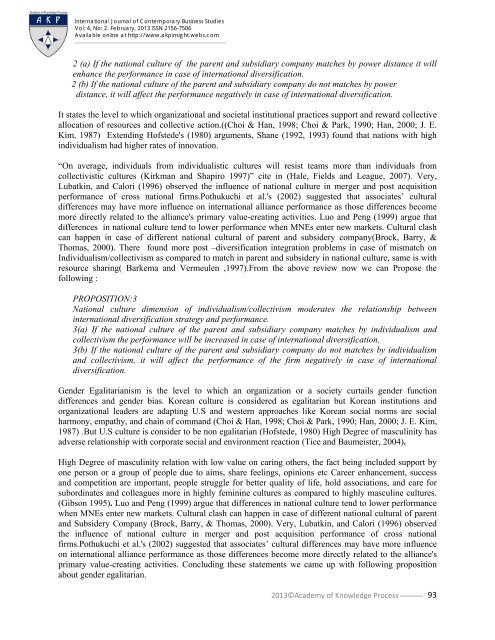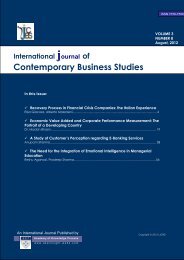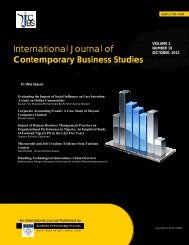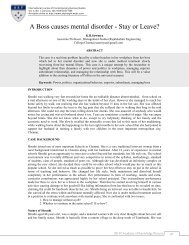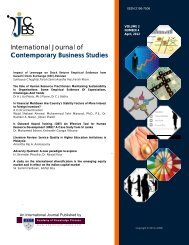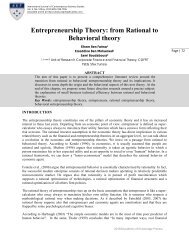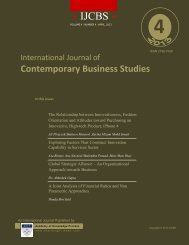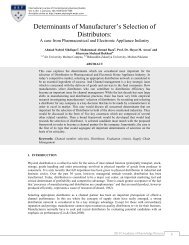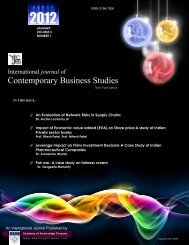Contemporary Business Studies - Academy of Knowledge Process ...
Contemporary Business Studies - Academy of Knowledge Process ...
Contemporary Business Studies - Academy of Knowledge Process ...
Create successful ePaper yourself
Turn your PDF publications into a flip-book with our unique Google optimized e-Paper software.
International Journal <strong>of</strong> <strong>Contemporary</strong> <strong>Business</strong> <strong>Studies</strong>Vol: 4, No: 2. February, 2013 ISSN 2156-7506Available online at http://www.akpinsight.webs.com2 (a) If the national culture <strong>of</strong> the parent and subsidiary company matches by power distance it willenhance the performance in case <strong>of</strong> international diversification.2 (b) If the national culture <strong>of</strong> the parent and subsidiary company do not matches by powerdistance, it will affect the performance negatively in case <strong>of</strong> international diversification.It states the level to which organizational and societal institutional practices support and reward collectiveallocation <strong>of</strong> resources and collective action.((Choi & Han, 1998; Choi & Park, 1990; Han, 2000; J. E.Kim, 1987) Extending H<strong>of</strong>stede's (1980) arguments, Shane (1992, 1993) found that nations with highindividualism had higher rates <strong>of</strong> innovation.“On average, individuals from individualistic cultures will resist teams more than individuals fromcollectivistic cultures (Kirkman and Shapiro 1997)” cite in (Hale, Fields and League, 2007). Very,Lubatkin, and Calori (1996) observed the influence <strong>of</strong> national culture in merger and post acquisitionperformance <strong>of</strong> cross national firms.Pothukuchi et al.'s (2002) suggested that associates’ culturaldifferences may have more influence on international alliance performance as those differences becomemore directly related to the alliance's primary value-creating activities. Luo and Peng (1999) argue thatdifferences in national culture tend to lower performance when MNEs enter new markets. Cultural clashcan happen in case <strong>of</strong> different national cultural <strong>of</strong> parent and subsidery company(Brock, Barry, &Thomas, 2000). There found more post –diversification integration problems in case <strong>of</strong> mismatch onIndividualism/collectivism as compared to match in parent and subsidery in national culture, same is withresource sharing( Barkema and Vermeulen ,1997).From the above review now we can Propose thefollowing :PROPOSITION:3National culture dimension <strong>of</strong> individualism/collectivism moderates the relationship betweeninternational diversification strategy and performance.3(a) If the national culture <strong>of</strong> the parent and subsidiary company matches by individualism andcollectivism the performance will be increased in case <strong>of</strong> international diversification.3(b) If the national culture <strong>of</strong> the parent and subsidiary company do not matches by individualismand collectivism, it will affect the performance <strong>of</strong> the firm negatively in case <strong>of</strong> internationaldiversification.Gender Egalitarianism is the level to which an organization or a society curtails gender functiondifferences and gender bias. Korean culture is considered as egalitarian but Korean institutions andorganizational leaders are adapting U.S and western approaches like Korean social norms are socialharmony, empathy, and chain <strong>of</strong> command (Choi & Han, 1998; Choi & Park, 1990; Han, 2000; J. E. Kim,1987) .But U.S culture is consider to be non egalitarian (H<strong>of</strong>stede, 1980) High Degree <strong>of</strong> masculinity hasadverse relationship with corporate social and environment reaction (Tice and Baumeister, 2004).High Degree <strong>of</strong> masculinity relation with low value on caring others, the fact being included support byone person or a group <strong>of</strong> people due to aims, share feelings, opinions etc Career enhancement, successand competition are important, people struggle for better quality <strong>of</strong> life, hold associations, and care forsubordinates and colleagues more in highly feminine cultures as compared to highly masculine cultures.(Gibson 1995). Luo and Peng (1999) argue that differences in national culture tend to lower performancewhen MNEs enter new markets. Cultural clash can happen in case <strong>of</strong> different national cultural <strong>of</strong> parentand Subsidery Company (Brock, Barry, & Thomas, 2000). Very, Lubatkin, and Calori (1996) observedthe influence <strong>of</strong> national culture in merger and post acquisition performance <strong>of</strong> cross nationalfirms.Pothukuchi et al.'s (2002) suggested that associates’ cultural differences may have more influenceon international alliance performance as those differences become more directly related to the alliance'sprimary value-creating activities. Concluding these statements we came up with following propositionabout gender egalitarian.2013©<strong>Academy</strong> <strong>of</strong> <strong>Knowledge</strong> <strong>Process</strong>93


